27 March 2021
Posted by Beth McKeeman

Writing Adventures
Group 1 – 14 Group 2 – 5
Adventure awaited us this week as we set forth on the Wilbur & Nisco Smith Adventure Writers of the Future competition (2020 anthology). The closing date for the competition is April 30th, so this week we mainly focused on planning with the idea that over the Easter break we could go away with a task in hand.
There are a few poets in Mayflower Young Writers, with one particularly die hard rhymer – you know who you are – and adventure writing was the perfect opportunity to lay down the challenge of writing prose. Ideas ranged from abandoned theme parks (in both groups, one was specifically identified as legally not Disney), quests to find estranged parents, escaping walled in apocalyptic towns whilst exploring old v. young, an exploration of nationalism through medieval Germany becoming part of the Holy Roman Empire, a middle aged couple trying to find the last sunset at the end of the world, and Indiana Jones and his temple vibe thing.
Adventure isn’t everyones wheelhouse, even though it can creep up alongside a myriad of other genres, slotting into various time periods and locations, both past and future, here and far far away - it’s given our writers a lot to consider and research. As for our poets, we might have been too hasty pigeon-holing them into prose. As Susmita pointed out at the end of Group 1, verse novels are books written in poetry form. It’s a bigger phenomena in the United States, however we have our share this side of the pond. The previous Irish Children’s Laureate, Sarah Crossan, is probably one of the better known verse novelist. However verse novels are not new; think of how the Iliad or Beowulf are told. Poetry has been an important part of storytelling since the dawn of narrative. The rhythm and meter help oral stories be told and be remembered, past from one generation, one fireside, to the next. So, if our poets can sustain a narrative for a minimum of 1500 words to create an adventure verse story, then we look with interest to see the epics they create.
A warmup before all this, though, was a call back to our World Book Day week and a look at The Brazilian Cat by Arthur Conan Doyle. In this short story, a puma traps a man all night and we follow his description of the cat and his fear.
We took a while to discuss what creatures we were most afraid of. Overwhelmingly these creatures were no mere animals, instead they were clowns and dolls. One might wonder how much Stephen King and his sway on the horror industry had an affect on these answers. We eventually got on to other traditional scaries such as spiders and snakes, but just as beauty is in the eye of the beholder so is fear and disgust. Susmita related a tale of staying with a friend who worked on a wildlife reserve, the sleepless night of worrying about bats and snakes followed by a thoughtless comment on the smell of the animals her friend worked with was not appreciated. With that in mind, how would we describe our night locked in a room with our nightmare creature? Would it be full of suspense or panicked terror? How would our senses react? How would we describe the creature?
Group 2 contrasted this emotional state entirely as we returned to Poetry for Good (Deadline April 9th). Having kicked off with an announcement of a Radio 4 call for submissions, we were charging into creating work for specified consumption. Susmita had acquired the book These are the Hands; Poems from the Heart of the NHS and from it selected poems by women to continue feeding our theme of women in the workplace. We were all surprised to learn of the existence of an Assistant NHS Librarian. With these poems to fuel us, we wrote our own about shop workers, office workers in the 70s, school teachers and Currer Bell, the pen name Charlotte Bronte was forced to adopt in order to be published.
We’re going on Easter break now, a time to refresh our creative batteries and come back full of wild new ideas. If you’ll miss us too much, don’t fret, over on ArtfulScribe’s Instagram there is a series of posts and 8pm Tuesday 15 minute live sessions for Emerging Writers (15-25 but all are welcome). Come along and join in.
See you all in the new term.
Gene's creature in the dark
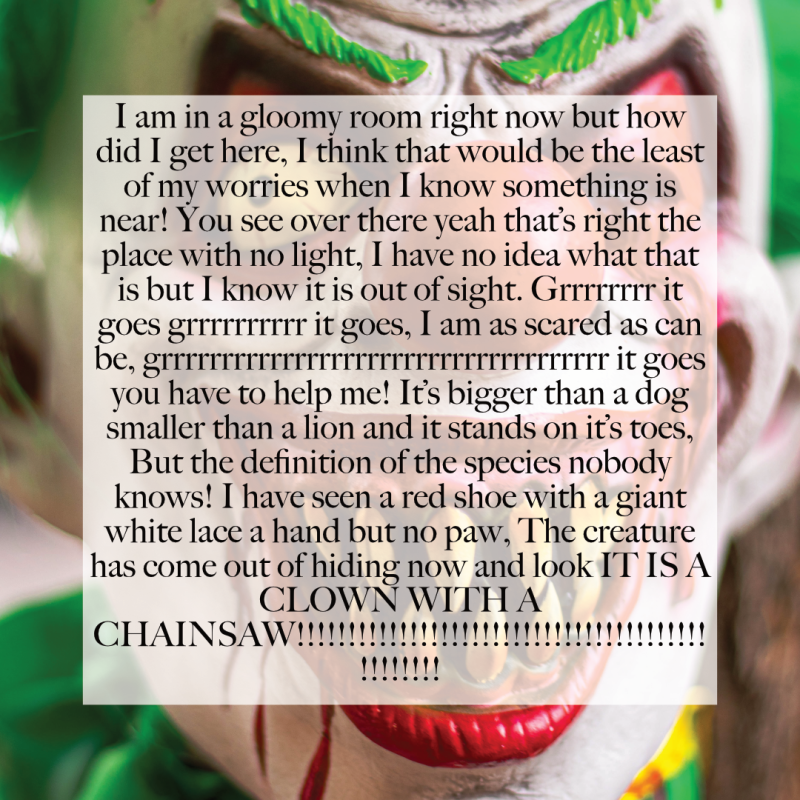
Eleanor's creature in the dark
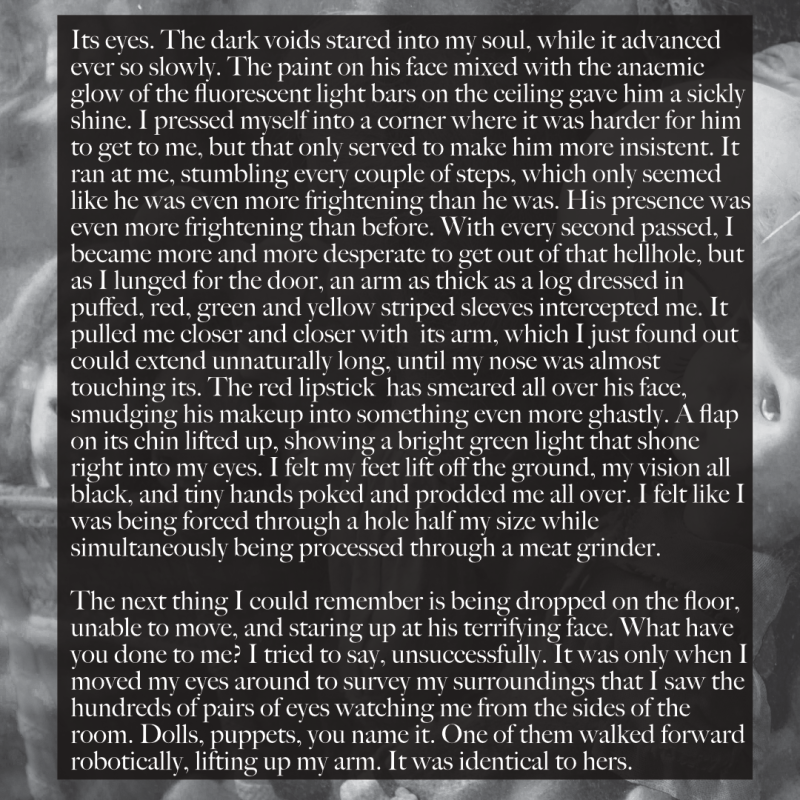
Kiki's creature in the dark
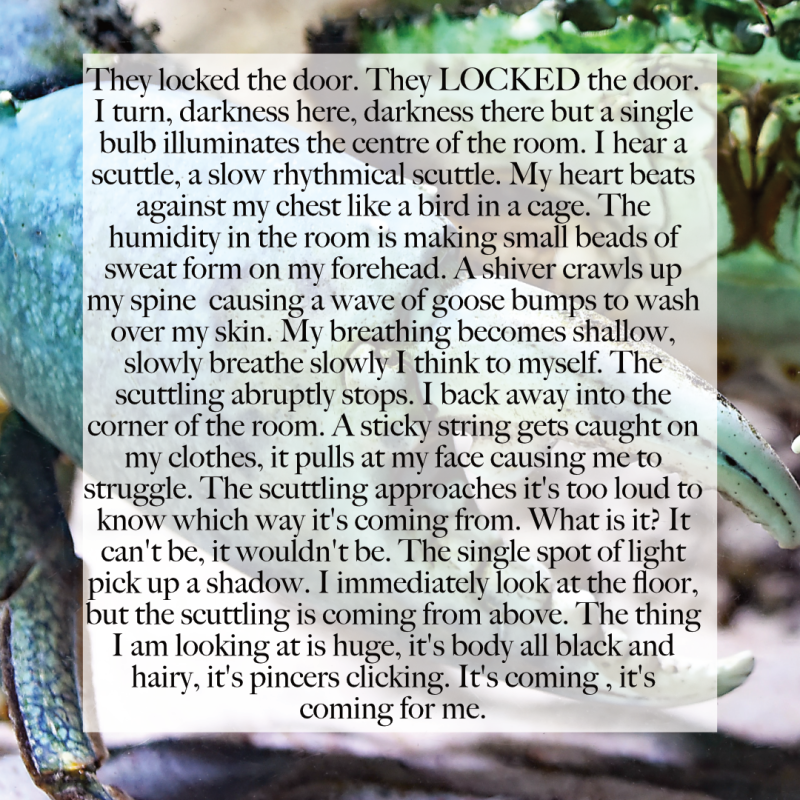
Unknown by Max
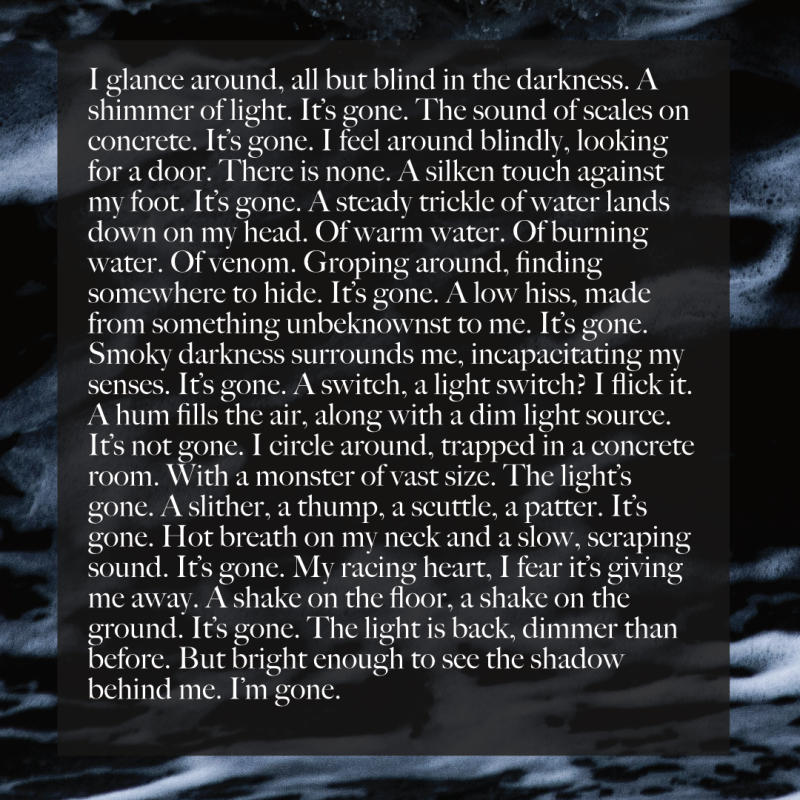
Naomi's creature in the dark
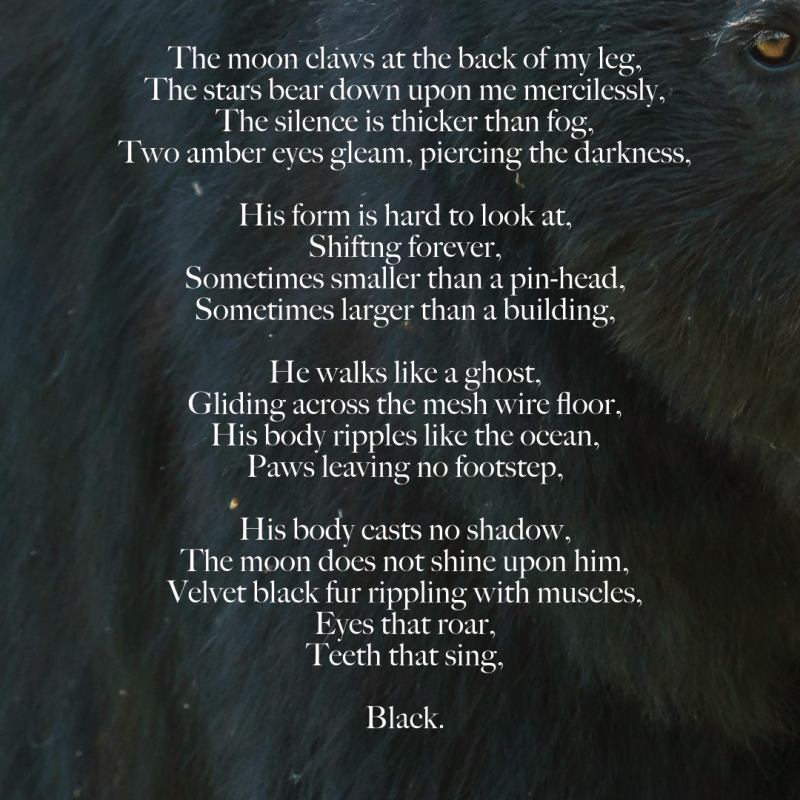
Shani's creature in the dark
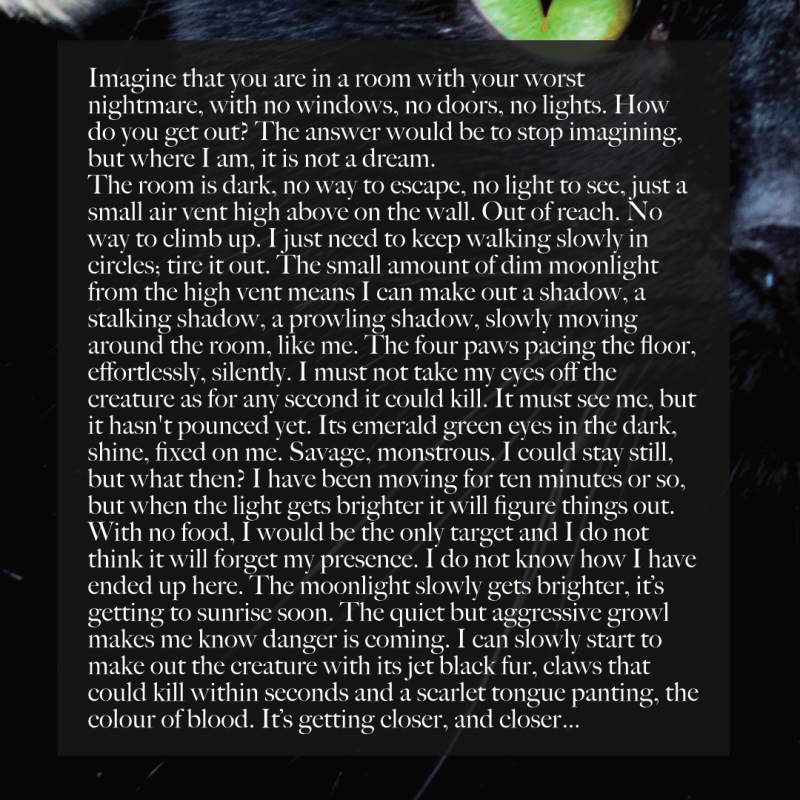
Archive
Junior & Young Writers Week 3: Return From The Magical World
Junior & Young Writers Week 2: African Mythology
Problems, Problems, Problems...
Cautionary Tales & Christmassy Opening Lines
You've Gotta Have Pace, Pace, Pace
Junior & Young Writers Week 1: Alien Encounters
Junior & Young Writers: Week 5 - Play on Words Pt. 2
Junior & Young Writers: Week 11 - end of term showcase [build a bard workshop]
Junior & Young Writers: Week 10 - Greek Theatre - chorus stories
Junior & Young Writers: Week 9 - Greek Origin Stories - Spring
Rubber Ducks & Writing Festivals
Junior & Young Writers: Week 7 - Greek Hero Stories [the 12 labours of Hercules]
Junior & Young Writers: Week 12 [Wild Words] - Stuff & Things
Junior & Young Writers: Week 11 [Wild Words] - World Building 2
Junior & Young Writers: Week 10 [Wild Words] - World Building
Junior & Young Writers: Week 9 [Wild Words] - Mystery & Choose Your Own Adventure
Junior & Young Writers: Week 8 [Wild Words] - Spooky Sequels & Potion Poems
Junior & Young Writers – Week 10 (Writers’ Inspiration) – Final Showcase
Junior & Young Writers – Week 9 (Writers’ Inspiration) – Editing & Performance Tips
Junior & Young Writers – Week 8 (Writers’ Inspiration) – Cuteness
Time goes on by Tavinder Kaur New
Junior & Young Writers – Week 7 (Writers’ Inspiration) – Natural Solutions
Junior & Young Writers – Week 6 (Writers’ Inspiration) – The Language of Fruit and Veg
Junior & Young Writers – Week 5 (Writers’ Inspiration) – Adventures In Space
Tinklebobs and Bedraggled Angles
Junior & Young Writers – Week 4 (Writers’ Inspiration) – Our Environment
Fortune Tellers & Future Letters
Junior & Young Writers – Week 3 (Writers’ Inspiration) – Home
Young Writers - Week 10 (The Art of Writing) – Final Week Showcase
Junior Writers - Week 10 (The Art of Writing) – Final Week Showcase
Young Writers – Week 9 (The Art of Writing) – Choose Your Own Adventure
Junior Writers – Week 9 (The Art of Writing) – Choose Your Own Adventure
Young Writers – Week 8 (The Art of Writing) – Sequel Stories
Junior Writers – Week 8 (The Art of Writing) – Sequel Stories
Young Writers – Week 7 (The Art of Writing) – Picture Prompts
Junior Writers – Week 7 (The Art of Writing) – Picture Prompts
Young Writers - Week 6 (The Art of Writing) - Script-writing & Dialogue
Junior Writers - Week 6 (The Art of Writing) - Script-writing & Dialogue
Junior Writers – Week 5 (The Art of Writing) – Poetry
Young Writers - Week 5 (The Art of Writing) - Poetry Potions
Edward The Martyr - A Competition!
Mood Boards and Postcards from Space
Young Writers - Week 3 (The Art of Writing) - PLOT
Junior Writers - Week 3 (The Art of Writing) - PLOT
Moomin Stories and Hollywood Pitches
Young Writers - Week 2 (The Art of Writing) - Genre & Setting
Junior Writers - Week 2 (The Art of Writing) - Genre & Setting
Prompts, Dialogues, and Cliché
Story Structure Part One: Exposition and Beyond...
Young Writers - Week 1 (The Art of Writing) - Character
Junior Writers - Week 1 (The Art of Writing) - Character
Young Writers - week 4 - Nature Writing [animals & wildlife]
Junior Writers - week 4 - Nature Writing [animals & wildlife]
Young Writers - week 3 - Nature Writing [trees/plants/flowers]
Junior Writers - week 3 - Nature Writing [trees/plants/flowers]
Young Writers - week 2 - 'fractured fairy tales'
Junior Writers - week 2 - 'fractured fairy tales'
Young Writers - week 1 - 'from deep inside a forest'
Creating Communities through Writing
WORDCUP - Hounsdown Session #6
Making pillows in a house full of feathers
WORDCUP - Hounsdown Session #5
Exploring home – a place, person, house
WORDCUP - Hounsdown Session #4
Stories From Our Streets at the Abbeyfield Wessex Society Reminiscence Session at Poole Library
What Do You Really Mean? Writing Dialogue for Scripts
WORDCUP - Hounsdown Session #3
Character Building & Murder Mysteries
Going inside – from a spark to a story
WORDCUP - Hounsdown Session #2
Maybe I Can Be Invisible After All... Monologues
Creative Writing: Fun Facts, Diverse Voices and Different Perspectives
Writing Competition - Stories From Our Streets
Stories From Our Streets Community Activity Pack
Thinking in-quiet, after the fire
Found Cities, Lost Objects: Women in the City Curated by Lubaina Himid CBE
Ekphrastic Jukebox - Writing to Music
ArtfulScribe LitFest Community Showcase 2023
Young writers exercise their creative power
Writing to The Sorcerer's Apprentice
The Mousetrap - Mayflower Young and Junior Writers Investigate Mystery!
Stories From Our Streets Launch!
Interview: In Conversation with Dr Victoria Leslie
The Missing Farmer/ Blackout Poetry & DADA
Exploring this wonderful World
Using props to create characters/ working as a writing room
Stories of the Dust and Character Questions
Storytelling and Escalation or Rising Action
Junior Writers Club Acrostic Poem
Notes on Intention for MAST Collective - Year 3 - Facilitation Focus
Earthquakes & Dominoes - MAST Collective Blog #4
SUPER MARIO AND POP CULTURE POEMS
Receptionists & Inky Voids - MAST Collective Blog #3
Saying No and saying YES on National Poetry Day!
There's a Dragon in the Wardrobe...
House Warming Party (The Mortifying Ordeal of Being Known) - MAST Collective Blog #2
Intern Blog 5 - The Publishing Process
POEMS TO SOLVE THE CLIMATE CRISIS
On The Streets With Theresa Lola
Intern Blog 4 - The Internship Journey
NEW DIRECTIONS, STARTING SMALL - THE ORWELL YOUTH PRIZE
LIGHTHOUSES, HOPE AND METAPHORS
on workshop and transformations: frogs, lions, and the duck that becomes a larder...
Poetry Ambassadors - Interview with April Egan
Intern Blog 1 - Finding a Voice
World Poetry Day: Fluffypunk and the Invisible Women
On Being a Writer: A Conversation by Beth Phillips & Sam Morton
Poetry Ambassadors - Interview with Kaycee Hill
UNHEARD VOICES: INTERNATIONAL WOMEN'S DAY, AND STORIES OF CONFLICT













